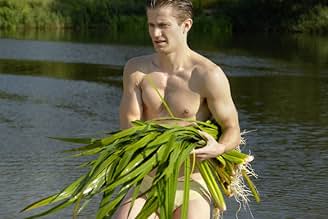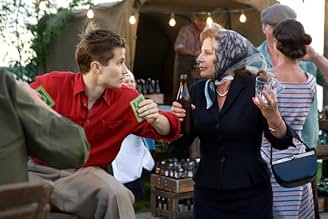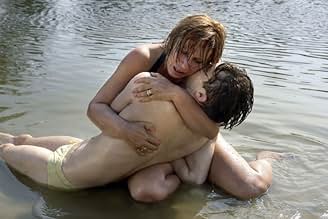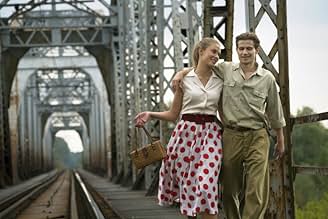Tatarak
- 2009
- 1h 25min
NOTE IMDb
6,3/10
1,5 k
MA NOTE
Ajouter une intrigue dans votre langueIn small-town Poland in the late 1950s, an aging woman married to a workaholic doctor meets a young man who makes her feel young again. Framed around this story, lead actress Krystyna Janda ... Tout lireIn small-town Poland in the late 1950s, an aging woman married to a workaholic doctor meets a young man who makes her feel young again. Framed around this story, lead actress Krystyna Janda discusses the death of her husband from cancer.In small-town Poland in the late 1950s, an aging woman married to a workaholic doctor meets a young man who makes her feel young again. Framed around this story, lead actress Krystyna Janda discusses the death of her husband from cancer.
- Réalisation
- Scénario
- Casting principal
- Récompenses
- 2 victoires et 2 nominations au total
Jakub Mazurek
- Bogus K.
- (voix)
Avis à la une
Andrzej Wajda's film tells a story of Marta, a middle-aged woman married to a small town doctor. Marta searches for happiness in the arms of a much younger man, Bogus. Their relationship is as innocent and fresh as the smell of the sweet rush that grows in the river where Marta and Bogus swam on their first date. But, just when everything seems to be going well for them, Bogus drowns, entangled in the roots of sweet rush he was trying to pick for Marta.
Wajda's film follows a two-pronged approach. On the one hand we see the actor reconstructing the last months of her husband's life in a simple but extremely touching way and, on the other, we follow the struggles of her fictitious character, who cannot get over the death of the man with whom she was so happy. Both of them have to cope with painful experiences - the actor with the death of her husband, and her character with the additional loss of her two sons who died in the Warsaw Uprising during the Second World War. Thus, the two women, Krystyna and Marta, eventually merge to become one and the same person.
Sweet Rush/Sweet Flag/Calamus, not only refers to a Greek Myth that parallels the film, but refers to a real fragrant weed that when rubbed, wafts a calming fragrant odour that drowses the senses, can lull you into a drifting, soothing, dream state of reverie, even an hallucinatory state, sharpens mental senses and clarity, is a alleviating purifier, an internal cleanser of the physical body, nourishes the entire body, relieves stress, is a restorative, etc, and when rubbed to harshly, when the reeds are crushed, the reed dies, and when you inhale or consume too much of the reed in any form, it can supposedly cause deadly cancer.
Our life is a sweet rush that vigorously flourishes along the rivers of this earth, our lives are the blood of our ancestors, rub us gently and our fragrance, our transient, ghostly reflection, wafts and murmurs and ripples through the clear waters of time, sweetly carrying forth the memories of our pasts and presents and futures, cross-pollinating our consciousness and subconsciousness, carrying us down into the deepest depths and lifting us up to the sweetest heights, but rub the rush too harshly, we are crushed, and death, and death.
Marta dives into the sweet rush of youth that may or may not be reality, it may be her waking fantasy hallucination which she rubbed into reality as a defense mechanism to deter herself from pondering her innate feeling that her husband's death was imminent. The romance is either the recasting of a past romance she had when she was a youth, or a romance she wishes she had with consummated with a young beau, or a romance she wishes she had with her husband but could ave had because he was much older than her. This waking fantasy, this sweet rush transports her through a halcyon summer setting where youth and beauty are truth and immortality, everything is the here and the now and the light, and death holds no domination. The man she breathes into life has a girlfriend, her as a young girl, her travelling far beyond the man's grasp, sailing beyond the sweet rush of an unfilled romance, and unfilled youth, already generating regrets, heading towards a war and marriage and children, who are untimely struck down by death.
Lulled into a waking dream-state reverie by the blending fragrance of the rushes and the cadence of her memories, she almost loses her complete grasp of reality; she engrafts into life the mystic undulating aureate reeds of her memory and breathes the honey of it down as her reality; the shadow of herself as a young women glides forth half-seen beyond her peripheral, the sheer gold perfection of amour eludes her, passion dimly discovered, the golden young man the embodiment of elusive memories, elusive dreams, elusive thoughts that stream through her soul sweetly when transiently glittering, but drown her when she breaks the surface, reality terrifying her, the dream shaken off, crushing the sweet rush, the golden young man, the memory, close to her heart
Marta the middle-aged woman picks up where Marta the youth rushes off and misses the sweetness of the time, crushing a young man's spirit. The closer middle-aged Marta comes to a sexual communion with the man, the closer to the surface the reality of her husband's imminent death she nears, and the moment Bogus (Bogus? A Bogus man? A fictitious relationship, a fictitious memory of something she never experienced, the sweet rush of youth, the sweet rush of a life stripped of that which made it sweet - her children and husband? Why must the lover be....Bogus?) penetrates the depths of her subconscious, purification begins, and the rushes crush her fantasies and quench her desires, the overdose of the sweet fragrance restores her to reality, and she walks away from the film set into the harsh reality that she not only can no longer experience the fragrant height of life with her husband Edward Klosinski, the film's cinematographer, but never had the chance to experience a sweet, sensual youthful romance with him because they were already well past their prime when they met and married. Shivering and wet, rain and a steel gray bridge, traffic and city buildings, a dying body, a dying life, hauling the nets when a shoal of immortality swims by. (Arseni Tarkovsky)
I don't believe in omens or fear Forebodings. I flee from neither slander Nor from poison. Death does not exist. Everyone's immortal. Everything is too. No point in fearing death at seventeen, Or seventy. There's only here and now, and light; Neither death, nor darkness, exists. We're all already on the seashore; I'm one of those who'll be hauling in the nets When a shoal of immortality swims by.
Wajda's film follows a two-pronged approach. On the one hand we see the actor reconstructing the last months of her husband's life in a simple but extremely touching way and, on the other, we follow the struggles of her fictitious character, who cannot get over the death of the man with whom she was so happy. Both of them have to cope with painful experiences - the actor with the death of her husband, and her character with the additional loss of her two sons who died in the Warsaw Uprising during the Second World War. Thus, the two women, Krystyna and Marta, eventually merge to become one and the same person.
Sweet Rush/Sweet Flag/Calamus, not only refers to a Greek Myth that parallels the film, but refers to a real fragrant weed that when rubbed, wafts a calming fragrant odour that drowses the senses, can lull you into a drifting, soothing, dream state of reverie, even an hallucinatory state, sharpens mental senses and clarity, is a alleviating purifier, an internal cleanser of the physical body, nourishes the entire body, relieves stress, is a restorative, etc, and when rubbed to harshly, when the reeds are crushed, the reed dies, and when you inhale or consume too much of the reed in any form, it can supposedly cause deadly cancer.
Our life is a sweet rush that vigorously flourishes along the rivers of this earth, our lives are the blood of our ancestors, rub us gently and our fragrance, our transient, ghostly reflection, wafts and murmurs and ripples through the clear waters of time, sweetly carrying forth the memories of our pasts and presents and futures, cross-pollinating our consciousness and subconsciousness, carrying us down into the deepest depths and lifting us up to the sweetest heights, but rub the rush too harshly, we are crushed, and death, and death.
Marta dives into the sweet rush of youth that may or may not be reality, it may be her waking fantasy hallucination which she rubbed into reality as a defense mechanism to deter herself from pondering her innate feeling that her husband's death was imminent. The romance is either the recasting of a past romance she had when she was a youth, or a romance she wishes she had with consummated with a young beau, or a romance she wishes she had with her husband but could ave had because he was much older than her. This waking fantasy, this sweet rush transports her through a halcyon summer setting where youth and beauty are truth and immortality, everything is the here and the now and the light, and death holds no domination. The man she breathes into life has a girlfriend, her as a young girl, her travelling far beyond the man's grasp, sailing beyond the sweet rush of an unfilled romance, and unfilled youth, already generating regrets, heading towards a war and marriage and children, who are untimely struck down by death.
Lulled into a waking dream-state reverie by the blending fragrance of the rushes and the cadence of her memories, she almost loses her complete grasp of reality; she engrafts into life the mystic undulating aureate reeds of her memory and breathes the honey of it down as her reality; the shadow of herself as a young women glides forth half-seen beyond her peripheral, the sheer gold perfection of amour eludes her, passion dimly discovered, the golden young man the embodiment of elusive memories, elusive dreams, elusive thoughts that stream through her soul sweetly when transiently glittering, but drown her when she breaks the surface, reality terrifying her, the dream shaken off, crushing the sweet rush, the golden young man, the memory, close to her heart
Marta the middle-aged woman picks up where Marta the youth rushes off and misses the sweetness of the time, crushing a young man's spirit. The closer middle-aged Marta comes to a sexual communion with the man, the closer to the surface the reality of her husband's imminent death she nears, and the moment Bogus (Bogus? A Bogus man? A fictitious relationship, a fictitious memory of something she never experienced, the sweet rush of youth, the sweet rush of a life stripped of that which made it sweet - her children and husband? Why must the lover be....Bogus?) penetrates the depths of her subconscious, purification begins, and the rushes crush her fantasies and quench her desires, the overdose of the sweet fragrance restores her to reality, and she walks away from the film set into the harsh reality that she not only can no longer experience the fragrant height of life with her husband Edward Klosinski, the film's cinematographer, but never had the chance to experience a sweet, sensual youthful romance with him because they were already well past their prime when they met and married. Shivering and wet, rain and a steel gray bridge, traffic and city buildings, a dying body, a dying life, hauling the nets when a shoal of immortality swims by. (Arseni Tarkovsky)
I don't believe in omens or fear Forebodings. I flee from neither slander Nor from poison. Death does not exist. Everyone's immortal. Everything is too. No point in fearing death at seventeen, Or seventy. There's only here and now, and light; Neither death, nor darkness, exists. We're all already on the seashore; I'm one of those who'll be hauling in the nets When a shoal of immortality swims by.
In Tatarak,great Polish cinéaste Andrzej Wajda has filmed what is important in life for all human beings.This is the reason why he has shown cinema,death,love and suffering as things which make a lot of sense for humanity.In some ways it can be said that his film is a beautiful ode to joys of love and film making.Both these creative processes are shown in great details.What is absolutely amazing to watch is the manner in which the film changes its tone.There are many moments where one feels as if a serious story is taking place. However, this is not entirely true as Andrzej Wajda ensures that his film is a good mix of all kinds of human emotions.This film has been made memorable by Krystyna Janda's excellent acting performance.She plays her role so convincingly that one is forced to believe that she is not acting but trying to be near her deceased husband.If excellent cinematography is a criteria then Tatarak would surely be acclaimed for the manner in which some of underwater scenes have been filmed. Acclaimed film critic and translator Lalit Rao saw Tatarak at 14th International Film Festival of Kerala 2009.
First off the English name of the title is a little misleading, it does not regard the effect of consuming sugar, it's referring to plants that grow by the riverside. But don't worry it's still good! It is a film within a film, although the purpose here is not so much a treatise on film making. The inner film is based on Jaroslaw Iwaszkiewicz's short story Tatarak. This concerns a melancholic doctor's wife Marta, living a slow-paced life in iron curtain Poland, I think the story is set around 1960. It is a very short story, the movie is only 85 minutes long, and half of it is the film outside the film. Marta has a measure of survivor syndrome following the war, and misses having young people around the house, and so strikes up a relationship with a sweet young working class man called Bogus, who is the boyfriend of a girl who sees herself as superior because she is a university student. She is pressurising him to be more than he is, and so his rendezvous with Marta is an escape for him too.
One of my favourite shots in terms of pure image craft in the movie is in the dining room of Marta's house, the set table is covered over in a white table-cloth (a formality of a bygone era?), and is reflected in a large ornate mirror on the back wall which tilts out at an angle as it is hung like a picture. This throws the image of the table so that it takes up almost the entire mirror, and it somehow is surrounded only in darkness, you cannot see any of the rest of the room. It is a shot that reminds me of the existential fragility of many of the old still life paintings for example of Adriaen Coorte.
The plant in question is more commonly known as Calamus or Sweet Flag. It has two quite different odours, the root is pungent whilst the blade is more sweet smelling. This is a metaphor for the transitory nature of happiness in the movie, the root is death, the blade is life. The rendezvous take place among the sweet rushes. The Greeks had a story for the origin of the rush, told in Nonnus's Dionysiaca, where, upon the drowning of his lover during a swimming race in the river, Calamus drowned himself in sympathy and turned into a sweet rush. So the soughing of the wind in the rushes is a lament.
Krystyna Janda, who plays Marta in the film, was married to Wajda's frequent collaborator cinematographer Edward Klosinski. He had a rather nasty cancer during the filming of Tatarak, and died. The film then becomes at some level a memorial for him. We see how the grief of the cancer infused Krystyna during the performance. We also see her deliver a monologue regarding her experiences with her husband around the time of his death, which are very sad. Mostly she is in a spartan room, delivering a monologue, but also we see her sometimes on set of the film, before or after shooting, and once, heartbreakingly in the rain.
Tatarak won the Alfred Bauer Prize at the Berlin Film Festival, the award is "given to a movie which opens new perspectives in film art". Well that is exactly what this movie does. You can scarcely watch a better film.
One of my favourite shots in terms of pure image craft in the movie is in the dining room of Marta's house, the set table is covered over in a white table-cloth (a formality of a bygone era?), and is reflected in a large ornate mirror on the back wall which tilts out at an angle as it is hung like a picture. This throws the image of the table so that it takes up almost the entire mirror, and it somehow is surrounded only in darkness, you cannot see any of the rest of the room. It is a shot that reminds me of the existential fragility of many of the old still life paintings for example of Adriaen Coorte.
The plant in question is more commonly known as Calamus or Sweet Flag. It has two quite different odours, the root is pungent whilst the blade is more sweet smelling. This is a metaphor for the transitory nature of happiness in the movie, the root is death, the blade is life. The rendezvous take place among the sweet rushes. The Greeks had a story for the origin of the rush, told in Nonnus's Dionysiaca, where, upon the drowning of his lover during a swimming race in the river, Calamus drowned himself in sympathy and turned into a sweet rush. So the soughing of the wind in the rushes is a lament.
Krystyna Janda, who plays Marta in the film, was married to Wajda's frequent collaborator cinematographer Edward Klosinski. He had a rather nasty cancer during the filming of Tatarak, and died. The film then becomes at some level a memorial for him. We see how the grief of the cancer infused Krystyna during the performance. We also see her deliver a monologue regarding her experiences with her husband around the time of his death, which are very sad. Mostly she is in a spartan room, delivering a monologue, but also we see her sometimes on set of the film, before or after shooting, and once, heartbreakingly in the rain.
Tatarak won the Alfred Bauer Prize at the Berlin Film Festival, the award is "given to a movie which opens new perspectives in film art". Well that is exactly what this movie does. You can scarcely watch a better film.
I am a great fan of Andrzej Wajda ever since I screened Knife in the Water for my film society members and have repeatedly viewed it. He is master in opening up his film in a slow pensive way so that when it ends, it hits you hard.
Sweet Rush of course starts in room in solitude lighted by a window in a Edward Hopper fashion. The scenes swing between under lighted home and clinic of the doctor husband to the brightly, quietly, peacefully pastoral countryside where the tragedy ends the serenity of Riverside. Story swings from Death to Life and back again. Suddenly at the river, you see the sequence which once looked to be part of the story being filmed.
I am not sure about the concept of film within film tried here.
In real life Wajda's cinematographer Edward Klosinski was Krystyna's real husband as in the film.
Krystyna Janda as Marta is superb.
The bleak dark room where Krystyna Janda recalls the illness and death of her husband is the root of the sweet rush lurking in the dark, muddy bed of the river - the reality. The contrasting nectar of life given so well and poignantly through the beautiful imagery, the light, the lush nature, the music, and the wonderfully naive scenes of Bogus and Maria, you can't help loving this film above its flaws. It feels like the Krystyna Janda real life scenes were made for the actress rather than for the audience. And though heart breaking it is, these monologues are a bit too long and too raw and end up like a dull paraphrasing of a poem. Probably this is intended, but still, I would rather see that time used for more on the characters, on the story and its questions.
Le saviez-vous
- AnecdotesThe film is dedicated to the late cinematographer Edward Klosinski, the husband of actress Krystyna Janda and one of Andrzej Wajda's closest collaborators. Klosinski died during filming and his wife decided to include in the movie her personally written monologue on his loss, which actually refers to the very subject of the film as well as the short story it is based on.
- ConnexionsReferences Cendres et diamant (1958)
Meilleurs choix
Connectez-vous pour évaluer et suivre la liste de favoris afin de recevoir des recommandations personnalisées
- How long is Tatarak?Alimenté par Alexa
Détails
Box-office
- Montant brut mondial
- 265 670 $US
- Durée1 heure 25 minutes
- Couleur
- Rapport de forme
- 2.35 : 1
Contribuer à cette page
Suggérer une modification ou ajouter du contenu manquant































